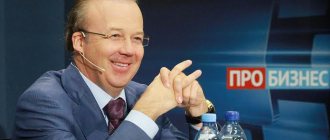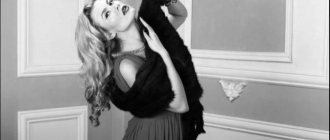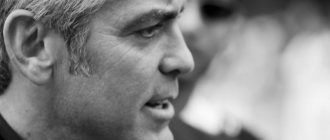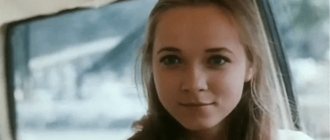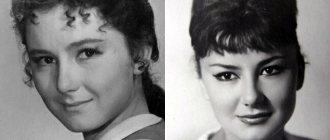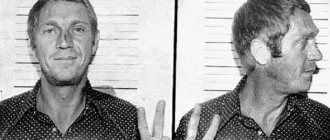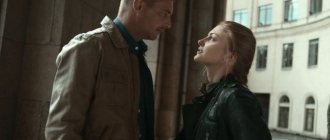Wikipedia has articles about other people with the surname Gleason.
| Domhnall Gleeson | |
| Domhnall Gleeson | |
Gleason at the 2020 San Diego Comic-Con International | |
| Place of Birth: | Dublin, Ireland |
| Profession: | actor, director, screenwriter, writer |
| Career: | 2004 - present time |
Domhnall Gleeson
(eng.
Domhnall Gleeson
, erroneously -
Domhnall Gleeson
; born May 12, 1983, Dublin, Ireland) is an Irish actor, director and writer. In 2006, he was nominated for a Tony Award for Best Actor in The Lieutenant of Inishmore. He is known for his role as Bill Weasley in the film Harry Potter and the Deathly Hallows, and the actor also played one of the main roles in the seventh episode of the Star Wars franchise[1].
Biography
Born in Dublin, the son of actor Brendan Gleeson and his wife Mary. In addition to Donal, the family has three younger brothers: Fergus, Brian and Ruairi. He graduated with a Bachelor of Arts degree from the Dublin Institute of Technology[2].
Career
After graduation, Gleason began acting in films and writing scripts. In 2006, he starred with his father in the film “Hairpins.”
In 2008 he appeared in the comedy “You're Bad” (?). The same year he starred in the film “Year of the Dog.” Gleeson starred in the short films Sixshooter and Boys Eat Girls, as well as the television series The Last Furlong.
In March 2009, it was confirmed that he had been cast as Bill Weasley in Harry Potter and the Deathly Hallows. Gleason was initially reluctant to star in a film with his father, but later changed his mind.[5]
In 2010, he starred alongside Keira Knightley, Andrew Garfield and Carey Mulligan in Never Let Me Go and with Jeff Bridges and Matt Damon in the Coen brothers' film True Grit.
In 2011, he won the IFTA Award for Best Actor for his role as Bob Geldof in the acclaimed biopic When Harvey Met Bob.
Verne Troyer
Troyer was the first of two actors to play the goblin Griphook in Harry Potter. Many, however, know him from his most famous role as Mini-Mee in Austin Powers.
Bean bacon for those who cannot eat fried meat: a detailed recipe
The Queen of England may give up the throne to protect her health
How to make beautiful water candles yourself: a very simple way
Filmography
| Year | Movie | Character |
| 2004 | Six-shooter | Cashier |
| 2005 | Stars | Brian (voice) |
| 2005 | Boys eat girls | Bernard |
| 2005 | The Last Furlong (TV series) | Sean Flanagan |
| 2006 | Hairpins | Trempis |
| 2009 | Year of the Dog | Anthony Armstrong |
| 2009 | Generosity Perrier | Clifford |
| 2009 | Velveteen | |
| 2009 | You're bad (?) (TV series) | |
| 2010 | Do not let me go | Rodney |
| 2010 | Feeling | Donal |
| 2010 | When Harvey Met Bob | Bob Geldof |
| 2010 | Iron Grit | Moon |
| 2010 | Harry Potter and the Deathly Hallows: Part 1 | Bill Weasley |
| 2011 | Harry Potter and the Deathly Hallows: Part 2 | Bill Weasley |
| 2012 | Judge Dredd 3D | Clan technician[6][7] |
| 2012 | Anna Karenina | Konstantin Levin[8][9] |
| 2013 | About waterfowl | |
| 2013 | TV series Black Mirror, season 2, episode “I'll be back soon” | Ash |
| 2013 | Boyfriend from the future | Tim Lake |
| 2013 | Calvary | Freddie Joyce |
| 2014 | Unbroken | Russell Allen "Phil" Phillips |
| 2014 | Frank | John |
| 2015 | Ex Machina | Caleb |
| 2015 | Star Wars: The Force Awakens[1] | General Hux |
| 2016 | The Revenant | Andrew Henry |
| 2017 | Mena / Mena | Monty Schaefer |
| 2017 | Star Wars: Episode 8 | General Hux |
Frank Dillane
Frank Dillane played the role of Lord Voldemort in his youth - Tom Riddle, when he was just a boy. Now he plays the main character in Fear the Walking Dead, Nick Clark.
A friend cooked a “hot dog” in potatoes. I haven't eaten anything tastier
Discuss ambiguity: how to calm your child if last call is online
A 15-year-old girl got creative and made her bedroom marble without marble.
Awards and nominations
| Year | Reward | Category | Film/TV series | Result |
| 2006 | Tony | Best Actor in a Play | "The Lieutenant of Inishmore" | Nomination |
| 2011 | IFTA | Best Actor | "When Harvey Met Bob" | Victory |
| 2012 | British Independent Film Awards | Best Supporting Actor | "The Secret Player" | Nomination |
Natalia Tena
The bright role of Auror Nymphadora Tonks was remembered by true fans. Now she can also be seen among the cast of “Game of Thrones”.
“No privileges for coronavirus vaccine”: Sanofi refused to provide priority
Making a comfortable hanging pillow for a cat: a simple way
“Prank and adventure”: Matveev photographed his wife on the cover of a glossy magazine with a phone camera
Notes
- ↑ 1 2
[www.starwars.com/news/star-wars-episode-vii-cast-announced
Star Wars: Episode VII
Cast Announced] (English). Star Wars.com (April 29, 2014). - [www.herald.ie/entertainment/tv-radio/domhnall-gleeson-to-star-in-rte-christmas-special-1569093.html "Domhnall Gleeson to star in RTÉ Christmas Special"]. Evening Herald (10 December 2007). Retrieved July 7, 2009. [www.webcitation.org/69XtN2w3r Archived from the original on July 30, 2012].
- [www.spielfilm.de/news/8941/bill-nighy-in-die-heiligtümer-des-todes.html Bill Nighy in 'Die Heiligtümer des Todes']. Spielfilm.de (German) (July 1, 2009). Retrieved July 7, 2009.
- [www.broadway.com/buzz/98252/tony-nominee-domhnall-gleeson-to-appear-in-final-harry-potter-films/ “Headlines: Tony Nominee Domhnall Gleeson to Appear in Final Harry Potter Films”]. broadway.com. (March 9, 2009). Retrieved July 7, 2009. [www.webcitation.org/69XtOmEdO Archived from the original on July 30, 2012].
- [www.hpana.com/news.20785.html Domhnall Gleeson confirmed as Bill Weasley for 'Deathly Hallows'](unavailable link - history
). HPANA (March 12, 2009). Retrieved July 7, 2009. [web.archive.org/20090320120523/www.hpana.com/news.20785.html Archived from the original on March 20, 2009]. - www.havc.hr/userfiles/file/press/shooting_stars/Invite_Press_Conference_Shooting_Stars.pdf
- [www.movies.ie/interviews/domhnall_gleeson_interview__star_of_true_grit_never_let_me_go__the_new_judge_dredd_movie Domhnall Gleeson Interview – Star of TRUE GRIT, NEVER LET ME GO & the new JUDGE DREDD Movie]. Movies.ie (February 16, 2011). — “Q: Finally you're working with Karl Urban on remake of Judge Dredd – what can you tell us? A: It's early days yet! I can't really say to much – it's from the same producers as Never Let Me Go. I can say that it's going to be EPIC and in 3D but with a very moral aspect to the story. If it works out as they've described, it's going to be very big." [www.webcitation.org/6BhwJtHPJ Archived from the original on October 26, 2012].
- [enchantedserenityperiodfilms.blogspot.com/2011/06/casting-news-for-anna-karenina-2012.html Enchanted Serenity of Period Films: Casting news for Anna Karenina (2012)]
- [www.dailymail.co.uk/tvshowbiz/article-1393723/Sherlock-Holmes-warparth-Benedict-Cumberbatch-swaps-tweed-trenches.html?ito=feeds-newsxml Sherlock's on the warparth: Benedict Cumberbatch swaps tweed for the trenches ], Daily Mail
(3 June 2011).
Excerpt characterizing Gleeson, Domhnall
And good for the people who, not like the French in 1813, having saluted according to all the rules of art and turning the sword over with the hilt, gracefully and courteously hand it over to the magnanimous winner, but good for the people who, in a moment of trial, without asking how they acted according to the rules others in similar cases, with simplicity and ease, pick up the first club he comes across and nail it with it until in his soul the feeling of insult and revenge is replaced by contempt and pity. One of the most tangible and beneficial deviations from the so-called rules of war is the action of scattered people against people huddled together. This kind of action always manifests itself in a war that takes on a popular character. These actions consist in the fact that, instead of becoming a crowd against a crowd, people disperse separately, attack one by one and immediately flee when they are attacked in large forces, and then attack again when the opportunity presents itself. This was done by the Guerillas in Spain; this was done by the mountaineers in the Caucasus; the Russians did this in 1812. A war of this kind was called partisan and they believed that by calling it that, they explained its meaning. Meanwhile, this kind of war not only does not fit any rules, but is directly opposite to the well-known and recognized infallible tactical rule. This rule says that the attacker must concentrate his troops in order to be stronger than the enemy at the moment of battle. Guerrilla warfare (always successful, as history shows) is the exact opposite of this rule. This contradiction occurs because military science accepts the strength of troops as identical with their number. Military science says that the more troops, the more power. Les gros bataillons ont toujours raison. [Right is always on the side of large armies.] In saying this, military science is similar to that mechanics which, based on considering forces only in relation to their masses, would say that forces are equal or unequal to each other because they are equal or unequal masses. Force (amount of motion) is the product of mass and speed. In military affairs, the strength of an army is also the product of the mass by something, some unknown x. Military science, seeing in history countless examples of the fact that the mass of troops does not coincide with the strength, that small detachments defeat large ones, vaguely recognizes the existence of this unknown factor and tries to find it either in geometric construction, then in weapons, or - the most common - in the genius of the commanders. But substituting all these multiplier values does not produce results consistent with historical facts. Meanwhile, one only has to abandon the false view that has been established, for the sake of the heroes, about the reality of the orders of the highest authorities during the war in order to find this unknown x. X this is the spirit of the army, that is, a greater or lesser desire to fight and expose oneself to the dangers of all the people who make up the army, completely regardless of whether people fight under the command of geniuses or non-geniuses, in three or two lines, with clubs or guns firing thirty once a minute. People who have the greatest desire to fight will always put themselves in the most favorable conditions for a fight. The spirit of the army is a multiplier for mass, giving the product of force. To determine and express the value of the spirit of the army, this unknown factor, is the task of science. This task is possible only when we stop arbitrarily substituting instead of the value of the entire unknown X those conditions under which force is manifested, such as: orders of the commander, weapons, etc., taking them as the value of the multiplier, and recognize this unknown in all its integrity, that is, as a greater or lesser desire to fight and expose oneself to danger. Then only by expressing known historical facts in equations and by comparing the relative value of this unknown can we hope to determine the unknown itself. Ten people, battalions or divisions, fighting with fifteen people, battalions or divisions, defeated fifteen, that is, they killed and captured everyone without a trace and themselves lost four; therefore, four were destroyed on one side and fifteen on the other. Therefore four was equal to fifteen, and therefore 4a:=15y. Therefore, w: g/==15:4. This equation does not give the value of the unknown, but it does give the relationship between two unknowns. And by subsuming various historical units (battles, campaigns, periods of war) under such equations, we obtain series of numbers in which laws must exist and can be discovered. The tactical rule that one must act in masses when advancing and separately when retreating unconsciously confirms only the truth that the strength of an army depends on its spirit. In order to lead people under the cannonballs, more discipline is needed, which can only be achieved by moving in masses, than in order to fight off attackers. But this rule, which loses sight of the spirit of the army, constantly turns out to be incorrect and is especially strikingly contrary to reality where there is a strong rise or decline in the spirit of the army - in all people's wars. The French, retreating in 1812, although they should have defended themselves separately, according to tactics, huddled together, because the spirit of the army had fallen so low that only the mass held the army together. The Russians, on the contrary, according to tactics, should have attacked en masse, but in reality they are fragmented, because the spirit is so high that individuals strike without the orders of the French and do not need coercion in order to expose themselves to labor and danger. The so-called partisan war began with the enemy’s entry into Smolensk. Before the guerrilla war was officially accepted by our government, thousands of people of the enemy army - backward marauders, foragers - were exterminated by the Cossacks and peasants, who beat these people as unconsciously as dogs unconsciously kill a runaway rabid dog. Denis Davydov, with his Russian instinct, was the first to understand the meaning of that terrible club, which, without asking the rules of military art, destroyed the French, and to him belongs the glory of the first step to legitimize this method of war.
